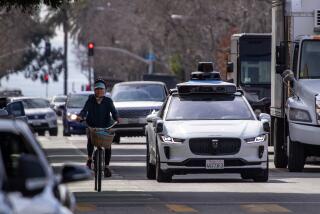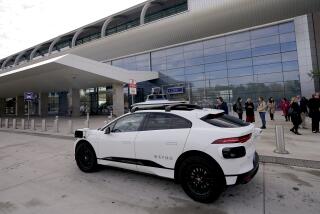Editorial: Background checks for Uber, taxi drivers pose issue for Legislature
Opponents of Uber, Lyft and other smartphone-powered transportation services have long lobbied for regulators to treat these companies the same way taxi companies are treated, given that they’re vying for many of the same customers. Now they’re pointing to reports that Uber allowed four people to become drivers in Southern California despite criminal records that allegedly would have stopped them from becoming cabbies. But just as Uber’s background checks aren’t foolproof, neither are those done by taxi companies. Rather than looking for another excuse to protect taxi operators from competition, policymakers should be asking what’s the best way to protect riders and their drivers.
California law treats app-based platforms such as Uber and Lyft as prearranged ride services, which are regulated by the state Public Utilities Commission, and not ride services that can be flagged down on the street, which cities regulate. All of these agencies require companies to do background checks on would-be drivers, but they take different approaches to how the checks should be done, what they should look for and what to do with the results.
The PUC requires app-based services to check for criminal convictions during the previous seven years anywhere in the U.S. involving major crimes and serious driving offenses, using the applicant’s Social Security number. Cities, meanwhile, may set different scrutiny periods. For example, in Santa Barbara the background check allows one driving-under-the-influence conviction if it’s more than a year old, and in Los Angeles the check disregards DUIs that are more than 3 years old if there were no injuries involved. Cities also run fingerprint checks, which give them access to the FBI criminal records database — a vault of arrest and conviction records that goes back much longer than seven years in some states. Yet that database is regarded by some law-enforcement agencies as less accurate than the commercial criminal-records databases used by the app-based services.
Citing the reports about the Uber drivers with criminal records, the City Council voted this week to review the decision by city airport commissioners to allow app-based services to pick up and drop off passengers at LAX. Uber responded by pointing to the hundreds of former taxi drivers who failed background checks in California because of serious criminal convictions apparently undetected by the fingerprint checks. The episode raises good questions for the Legislature about how best to ensure the safety of consumers who get into a stranger’s car, regardless of who’s driving it or where. In the meantime, however, the council should be welcoming travelers to LAX with an abundant selection of rides to their destination.
Follow the Opinion section on Twitter @latimesopinion and Facebook
More to Read
A cure for the common opinion
Get thought-provoking perspectives with our weekly newsletter.
You may occasionally receive promotional content from the Los Angeles Times.






